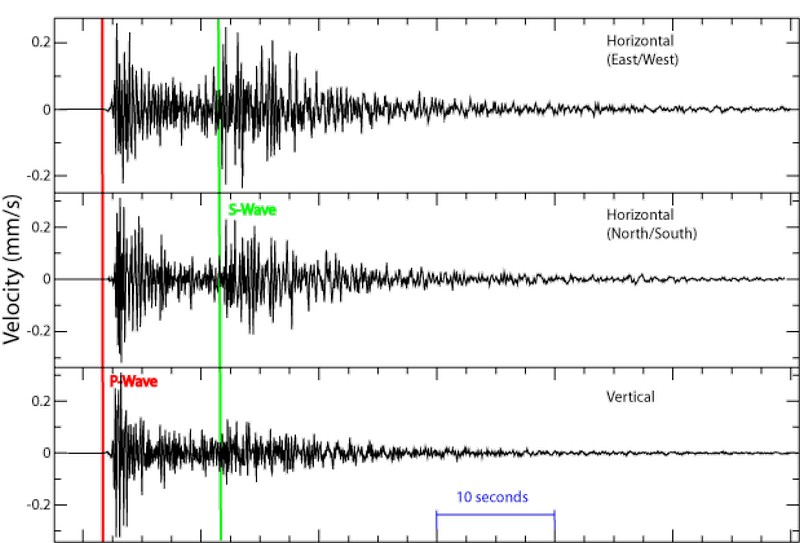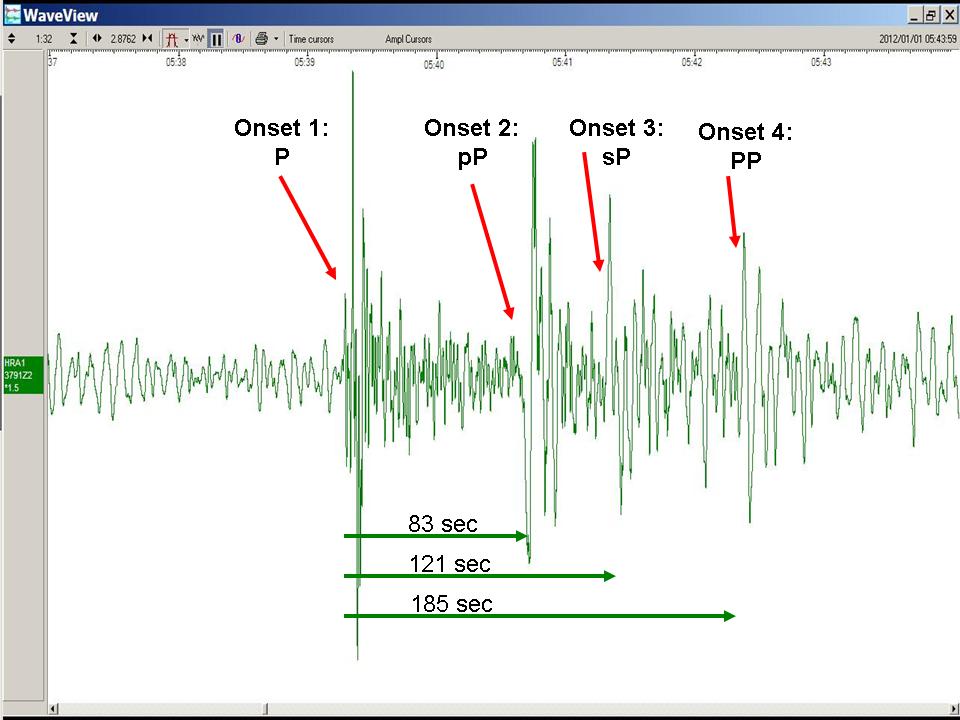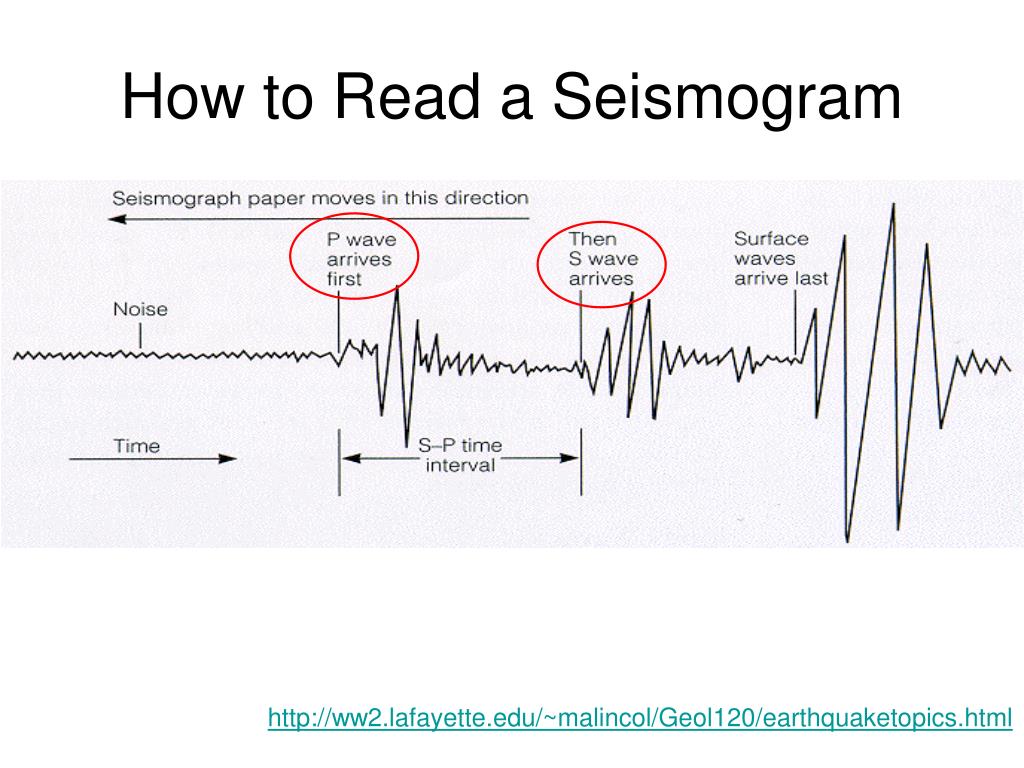How To Read A Seismograph
How To Read A Seismograph - When there is no earthquake reading, there is. Seismograms are read from left to right. The term seismograph usually refers to the combined seismometer. Web on a seismogram, the horizontal axis = time (measured in seconds) and the vertical axis= ground displacement (usually measured in millimeters). Each rotation of the seismograph drum is thirty minutes. Time marks show when the earthquake occurred. Web seismograph definition, any of various instruments for measuring and recording the vibrations of earthquakes. The spectrograms show a record of the frequency content of ground motion at a particular seismograph. The ground motion at each seismometer. Web a seismograph is a tool scientists use to record earthquakes and measure their strength.
Three earthquakes, the largest having a magnitude of 3.1, occurred within two hours of each other on may 7, 2000, as detailed in the table below. New manual of seismological observatory practice by peter bormann,. Web seismograph definition, any of various instruments for measuring and recording the vibrations of earthquakes. Each plot represents 24 hours of data from one station. The interface includes three panels: Web how to read the display the spectrograms displayed are from a few of the seismograph stations routinely recorded by the northern california seismograph network. We observe earthquakes with a network of seismometers on the earth's surface. A list of earthquakes, a map, and a. Web green is the vertical ground movement, up and down. There is another shaking at minute 20:02 utc, a bigger one at 20:12, and an even larger one at 20:17, with the biggest one at 20:31.
The distance to the earthquake from each. A list of earthquakes, a map, and a. Time marks show when the earthquake occurred. Seismograms are read from left to right. This is a more efficient way to read. Web when an earthquake occurs, it generates an expanding wavefront from the earthquake hypocenter at a speed of several kilometers per second. Web reading the seismograph lines. The spectrograms show a record of the frequency content of ground motion at a particular seismograph. Each of the arrows marks one of these onsets or phases,. Web green is the vertical ground movement, up and down.
Scientists Develop a New Method for Detecting Overlooked Weak Earthquakes
Web ever wondered how to read the data on a seismogram? Seismograms are read from left to right. The term seismograph usually refers to the combined seismometer. The interface includes three panels: The volcanologists were stationed in a detached cluster of buildings on a ridge overlooking the town.
How to Read a Seismogram Part II
Then, roughly at 19:57 utc, the ground starts to wiggle. The volcanologists were stationed in a detached cluster of buildings on a ridge overlooking the town. Web how to read the display the spectrograms displayed are from a few of the seismograph stations routinely recorded by the northern california seismograph network. This playful animation created for the general public by.
reading seismographs YouTube
Web an illustrated guide to reading a seismogram (usgs) everything you need to know about seismology can be found in this manual!: Web when an earthquake occurs, it generates an expanding wavefront from the earthquake hypocenter at a speed of several kilometers per second. Web a seismograph is a tool scientists use to record earthquakes and measure their strength. The.
Seismograph Readings Stock Image Image 21177051
Time marks show when the earthquake occurred. Web an illustrated guide to reading a seismogram (usgs) everything you need to know about seismology can be found in this manual!: Web green is the vertical ground movement, up and down. Each of the arrows marks one of these onsets or phases,. The rvo, established after the 1937 disaster, had anticipated a.
How to Read a Seismogram Part II
This is a more efficient way to read. Time marks show when the earthquake occurred. Web ever wondered how to read the data on a seismogram? Seismograms are read from left to right. When there is no earthquake reading, there is.
1906 San Francisco Earthquake HubPages
Web when an earthquake occurs, it generates an expanding wavefront from the earthquake hypocenter at a speed of several kilometers per second. Web a seismograph is a tool scientists use to record earthquakes and measure their strength. Each of the arrows marks one of these onsets or phases,. The spectrograms show a record of the frequency content of ground motion.
What is seismograph
This is a more efficient way to read. Web green is the vertical ground movement, up and down. Each plot represents 24 hours of data from one station. Web seismologists study earthquakes by looking at the damage that was caused and by using seismometers. Web an illustrated guide to reading a seismogram (usgs) everything you need to know about seismology.
PPT How are Earthquakes Recorded? PowerPoint Presentation, free
Each of the arrows marks one of these onsets or phases,. Each rotation of the seismograph drum is thirty minutes. The spectrograms show a record of the frequency content of ground motion at a particular seismograph. Web on a seismogram, the horizontal axis = time (measured in seconds) and the vertical axis= ground displacement (usually measured in millimeters). Web an.
Seismology in the Classroom Activity Facts about america
The spectrograms show a record of the frequency content of ground motion at a particular seismograph. Web green is the vertical ground movement, up and down. The rvo, established after the 1937 disaster, had anticipated a. This activity is not recommended for use. Web how to read the display the spectrograms displayed are from a few of the seismograph stations.
How To Build Your Very Own Seismograph Earth Science Experiment for
When there is no earthquake reading, there is. We observe earthquakes with a network of seismometers on the earth's surface. A list of earthquakes, a map, and a. Web reading the seismograph lines. Web starting from the left, it begins as an almost straight line.
Web Green Is The Vertical Ground Movement, Up And Down.
The interface includes three panels: Each of the arrows marks one of these onsets or phases,. We observe earthquakes with a network of seismometers on the earth's surface. Therefore, on seismograms, each line measures thirty minutes.
Three Earthquakes, The Largest Having A Magnitude Of 3.1, Occurred Within Two Hours Of Each Other On May 7, 2000, As Detailed In The Table Below.
Web when an earthquake occurs, it generates an expanding wavefront from the earthquake hypocenter at a speed of several kilometers per second. Web on a seismogram, the horizontal axis = time (measured in seconds) and the vertical axis= ground displacement (usually measured in millimeters). When there is no earthquake reading, there is. The spectrograms show a record of the frequency content of ground motion at a particular seismograph.
Each Rotation Of The Seismograph Drum Is Thirty Minutes.
The volcanologists were stationed in a detached cluster of buildings on a ridge overlooking the town. This activity is not recommended for use. There is another shaking at minute 20:02 utc, a bigger one at 20:12, and an even larger one at 20:17, with the biggest one at 20:31. Seismograms are read from left to right.
Seismographs Are Equipped With Electromagnetic Sensors.
New manual of seismological observatory practice by peter bormann,. This playful animation created for the general public by the usgs describes what a seismogram is, how they are recorded and what to look for in the seismic traces. Web starting from the left, it begins as an almost straight line. Web about press copyright contact us creators advertise developers terms privacy policy & safety how youtube works test new features nfl.









